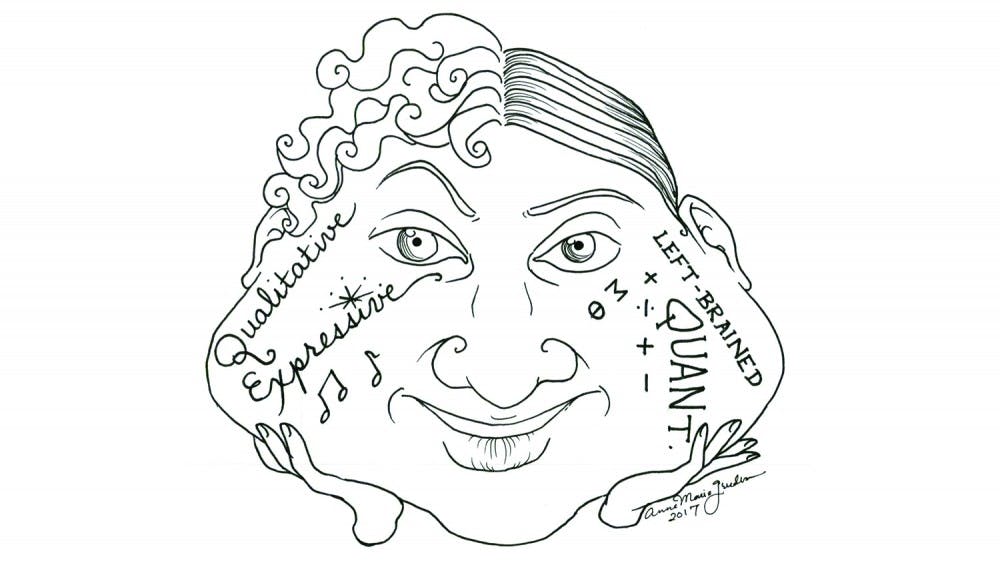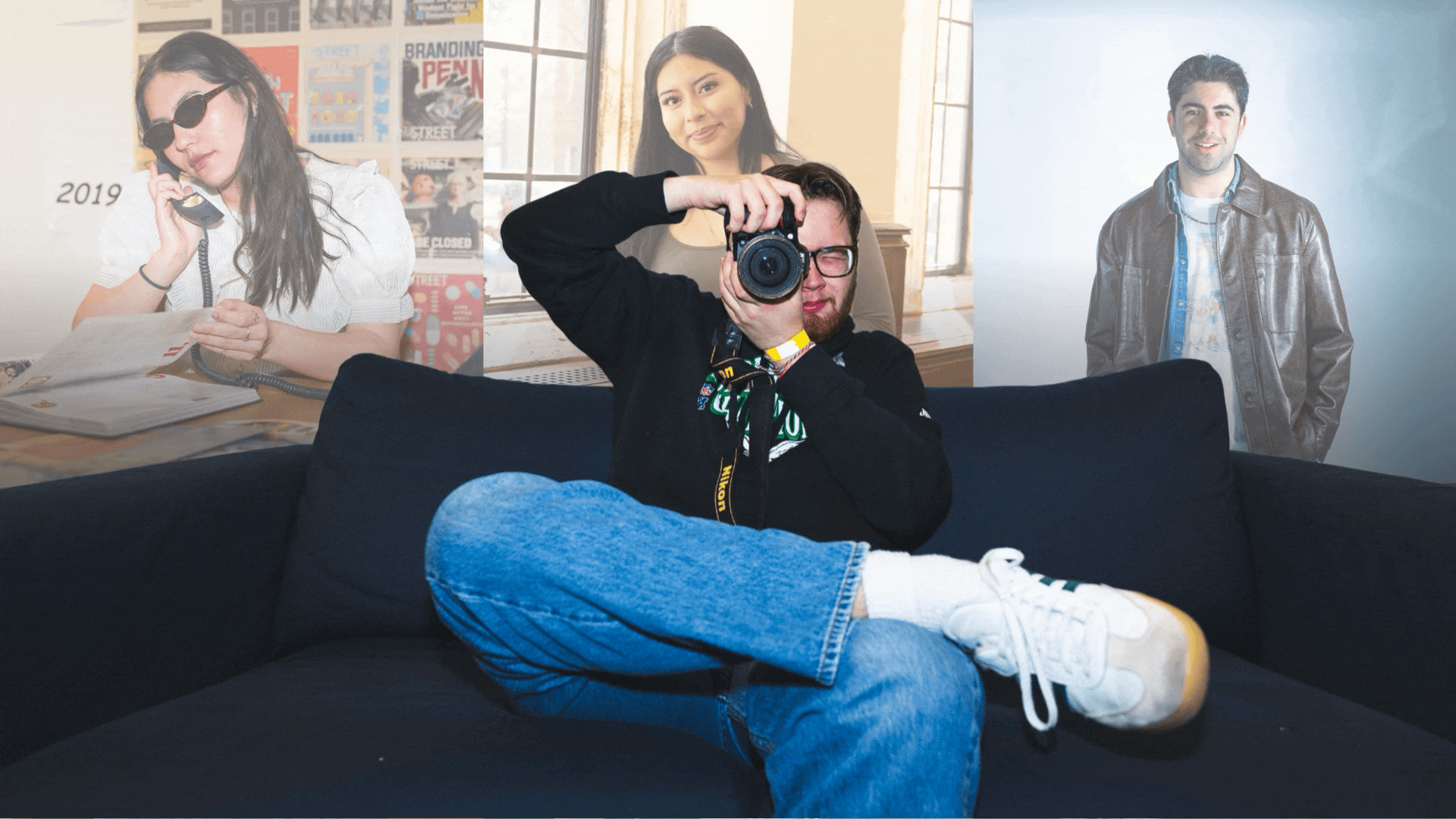My younger brother, a high school senior, is applying to Penn. His college process reminds me of my own—the stress, the helicopter parents and even the same application prompt ("Why Penn?"). But despite the parallels, his application is fundamentally different from mine. When Penn asks him his intended major, he'll check the "Economics" box, while I checked “Undecided.”
If he gets in, his experience will undeniably be different from mine. Though three years younger, he knows exactly what he wants to do, where he wants to go, what he wants to be. He will likely never set foot in Addams’s arts studios, see the dusty glory of the basement of Hayden Hall or find himself sitting in the Arts Cafe of the Kelly Writers House. His path has been, and always will be, clear.
Mine, however, never has been. For me, the quintessential question of college—“So, what do you want to do?”—has always been met with awkward silences, inarticulate stuttering or vague, meaningless statements. My first semester of college, I took Drawing I, Intro to Astronomy, Intro to Philosophy, and the Writing Seminar—an eclectic smorgasbord of classes.
My parents had always raised me to be a quantitative thinker. In high school, they pushed me towards math and science, encouraging me to be a “mathlete” or join the “science club.” I did what they wanted me to do: I led a data–collection club called Sustainable Seas, presented at the Astro–Geophysical Union’s annual conference and always took Honors Math classes. I assumed I'd continue down that path in college, believing my parents when they told me I was left–brain dominant.
But I could never bring myself to fully buy into this vision. There were shreds of doubt in my mind throughout high school, and when I finally got to college, I could finally distance myself from my parents' expectations. I was ready to dive into that indecision, to explore the parts of myself that had been hidden. But to my surprise, there were few people like me at Penn. All my friends were engineers, pre–meds or Whartonites set on finance and accounting. From day one, everyone knew what they wanted to do—and they were on their way to getting there. In a haze of paranoia and panic, I felt something that I had never before felt in high school: I felt behind.
So I continued along the science track, silencing that voice in the back of my head. My parents encouraged me to consider pre–med, which I did briefly. I’m not sure I ever actually saw myself doing the “hard” science that my parents so adamantly wanted me to do, but I still went through the motions. I thought about what I liked and what would placate my parents and planned to major in Environmental Science.
To my parents (both of whom voted for Trump and don’t believe in global warming) this was unacceptable—soft, to say the least. But I showed them the Earth Science web page, which listed the required courses (Math 104, Math 114, Chemistry 101, Chemistry 102, Physics 101, Biology 101, etc.), and they realized perhaps Environmental Science wasn’t so soft. Perhaps I could follow on the “hard” science track, without having to choose; after all, Environmental Science is notoriously the “catch–all” of the sciences, where you get a little bit of everything rather than focusing on one thing. Maybe I could stick with what I had been good at, while still making a positive difference.
When I declared Environmental Science, I felt like I had finally found my place in Penn's academic scheme. But my transcript begged to differ. For someone who was supposed to be a quantitative person, my transcript was loaded with classes like Drawing and Painting, History of the American South and Intro to Creative Writing. I felt like I was missing something, like there was some part of me that I was ignoring.
I quickly discovered that I was becoming disenchanted with the path I had set out on. “Hard” science no longer really appealed to me. I found myself enjoying my other electives more so than my in–major classes. I felt like I needed a creative outlet that I just couldn’t find in classes like multi–linear calculus.
Somewhere along the line, I had unintentionally wracked up a number of English classes. And then I suddenly realized that I was way more passionate about Kerouac and Ginsberg than I was the Ideal Gas Law or Rolle’s Theorem. I felt like I had to choose between two completely opposite sides of myself, two completely opposite life paths — between choosing to make my parents happy or to make myself happy.
So to everyone reading this who has felt some, all or even more of the indecision I felt: it’s okay. I ended up deciding to be a double major, choosing to do both English and Environmental Science. And after finally adding English to my transcript, I found myself with a fresh feeling of purpose, even in my quantitative classes. At the end of the day, whatever you choose to study doesn’t actually matter that much; what does matter is that you feel fulfilled, that you cultivate a spirit of investment and purpose and that you learn to love what you do. College is a time to create habits, to learn how to learn and find yourself in the things you study.
Ultimately, even at Penn, there is a space for people who feel like they still want to check the undecided box. My brother will never face the same doubt that I faced, and he will likely be happier for that. But for me, finding happiness means pursuing that space of indecision, of apparent inconsistency, of distancing myself from the expectations of my family and building on my own. I honestly believe that Penn offers you a chance to be whatever you want to be — even if that means changing your major, or even majoring in two disparate things at once. You don’t have to choose between quantitative and qualitative, pleasing your parents and following your passions. There's a way to do both.







